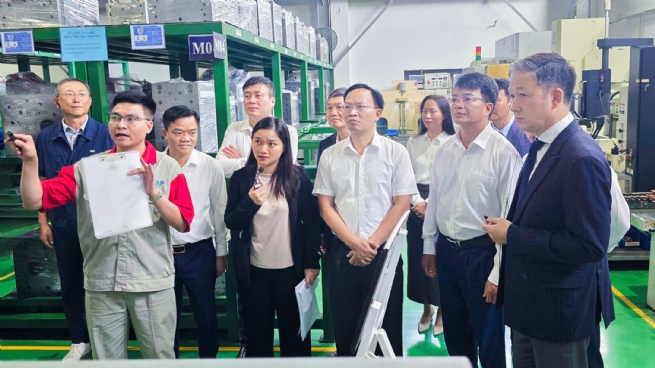Elevating Vietnamese Enterprises in Global Value Chains
No longer confined to contract manufacturing, many Vietnamese companies are actively upgrading technology, improving production processes, and building skilled workforces to meet the demanding standards of major corporations such as Samsung, Toyota, Honda, and Piaggio. These initiatives are creating opportunities for Vietnamese firms to become essential links in global supply chains while reinforcing the country’s supporting-industry foundation.

Raising the standard: Key to joining global supply chains
In Bac Ninh, An Lap Plastic Co., Ltd. once depended on manual production. After participating in Samsung’s Smart Factory Project, the company adopted an Internet of Things (IoT) system that connects and gathers data from smart devices across production, warehousing, equipment, and quality control. As a result, its smart-operation index increased from 1.7 to 2.8, production-plan completion rose from 80% to 92%, and product defect rates fell from 12% to only 0.5%. This transformation enabled An Lap to qualify as a Tier-1 supplier for Samsung.
Similarly, Vina Technology Engineering Co., Ltd. in Thai Nguyen upgraded its cleanroom from Class 10,000 to Class 1,000, reducing particle-contamination defects by 68.7%. The company also conducted 26 in-house training courses for over 300 employees and introduced a rack-based warehouse management system that cut material search time from 60 seconds to just 10. These improvements boosted product quality and enabled Vina Technology to meet the stringent standards of multinational manufacturers.
In the mechanical and automotive sectors, many suppliers for Toyota and Honda have adopted the Toyota Production System (TPS), improving precision, optimizing processes, and shortening delivery times. Meeting the standards of “zero defects” and “on-time delivery” has become a prerequisite for participation in global supply chains.
These examples show that Vietnamese enterprises are actively investing in technology, modernizing production lines, and enhancing management capacity, thereby positioning themselves as vital links in global value chains.
Digital transformation and partnerships - “passport” to global markets
In Ninh Binh, Korea Copper Tech Vietnam Co., Ltd. has implemented an Internet of Things (IoT) system that collects real-time production data, cutting process errors by 30%. The company optimized its packaging layout, reducing transport distance by 50% and shortening delivery time from five days to four. Standardizing its finished-goods warehouse increased capacity by 30% and laid the groundwork for introducing Enterprise Resource Planning (ERP) software. These improvements boosted productivity and met the data-transparency standards required by global clients such as Samsung and Piaggio.
In Bac Ninh, AMA Holdings Investment JSC adopted an online production data display system and an electronic checklist that allow managers to monitor operations and make timely decisions. Equipment efficiency rose from 90% to 95%, while defect rates fell by 75%. In Hai Phong, Van Long Technical Plastic JSC automated its packaging process and introduced batch-based product code management. Productivity increased by 15-20%, and traceability time was cut in half, meeting the quality standards of leading automotive and motorcycle manufacturers.
These advancements stem from both internal efforts and close collaboration with government agencies and foreign-invested corporations. Since 2022, Samsung’s Smart Factory Project, in partnership with the Ministry of Industry and Trade, has helped 82 Vietnamese enterprises improve production, management, and workforce capabilities, while training 123 smart-factory specialists. Earlier, the Supporting Industry Development Program had provided consulting to 379 enterprises and trained 406 specialists and over 200 mold technicians.
Major corporations have also launched supplier development programs, sending engineers directly to Vietnamese factories to standardize processes and enhance product quality. As a result, Vietnamese firms can now export components to Thailand, Indonesia, and India while building the capacity to become long-term partners of global corporations.
This impact has elevated the entire supporting industry, from technical plastics and aluminum casting to electronic circuits and precision mechanics. Supply chains in Vietnam are becoming more integrated, transparent, and reliable.
These success stories show that Vietnamese enterprises are actively embracing digital transformation, technological innovation, and modern management to participate more deeply in global value chains. By applying smart technologies, raising quality standards, automating production, and investing in human resource development, they are not only meeting the strict requirements of partners such as Samsung, Toyota, and Honda but also enhancing the global standing of Vietnam’s supporting industry.








